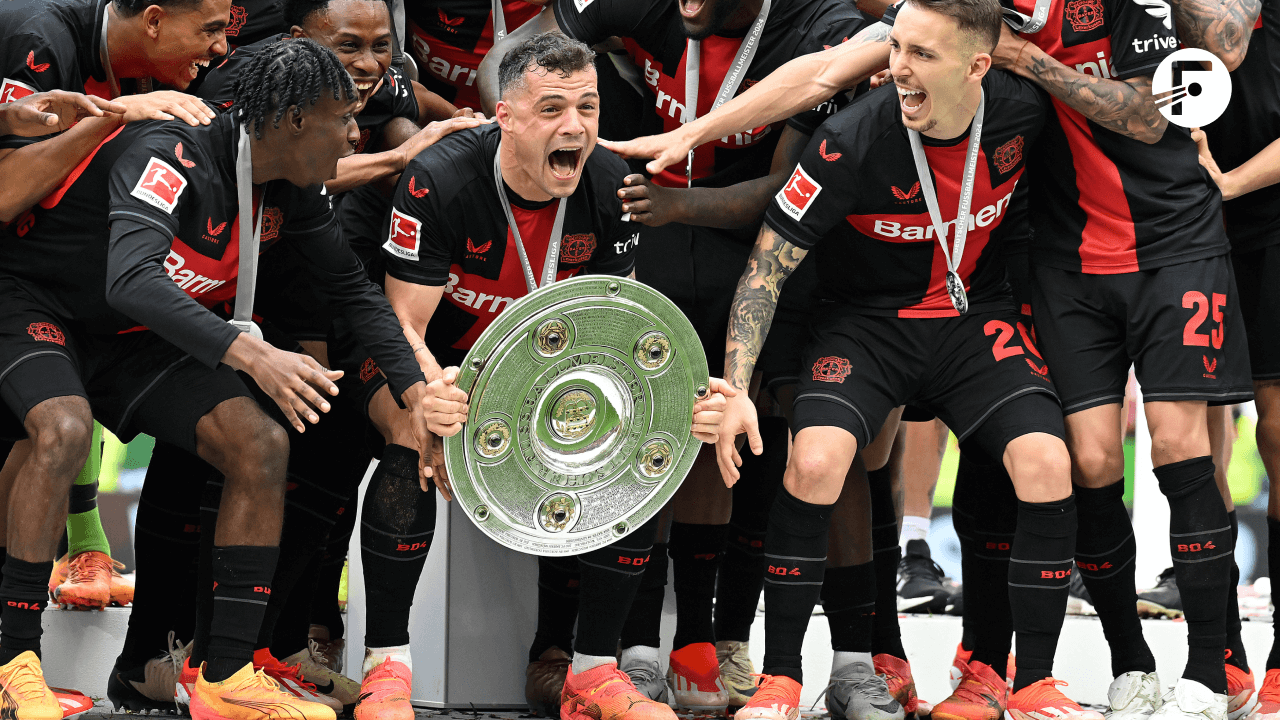In football, ‘Unprecedented’ has become a synonym for things that are, well, prececented. Not everything is remarkable, but every now and again, a team or a manager come along and change everything. That’s exactly what Bayer Leverkusen and Xabi Alonso have done.
By Alex Roberts
Not since the unification of Germany has a club gone an entire Bundesliga campaign unbeaten, not even the great Bayern Munich sides of yore, led by Franz Beckenbauer and Gerd Müller.
This season was meant to be the same. Munich would win the title at a canter, with all opponents rolling over to show plump underbellies, ready to be torn open by Leroy Sané, Jamal Musiala, and new star man Harry Kane.
No one could have predicted what Leverkusen were going to do. Instead of rolling over they bore their teeth and Bayern shirked away, tails between their legs squealing, falling into third place as Stuttgart took their advantage.
On Saturday, May 18th, the referee blew his whistle and Bayer Leverkusen’s invincible season was confirmed, beating Augsburg 2-1. The stadium rightfully erupted. They had just won their first ever Bundesliga title without losing a single game.
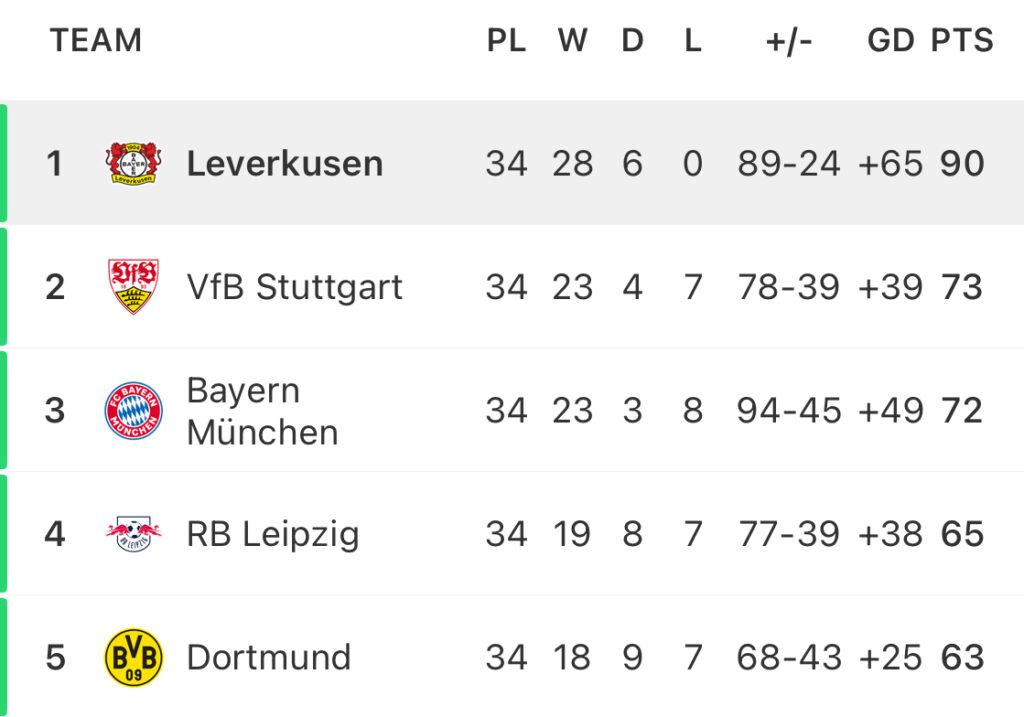
For football fans across the globe, it’s hard to imagine it getting any better than that. Surely this is the pinnacle? How could this ever be topped? Well, with 51 games and zero defeats, Leverkusen are on the precipice of something truly unprecedented… an unbeaten treble.
The last club to get close was Louis van Gaal’s Ajax in 1994/95, winning the Eredivisie and Champions League unbeaten but ultimately failing after getting knocked out by rivals Feyenoord in the KNVB Cup quarter final.
Many beers will have been sunk after the win against Augsburg by fans, players, and staff alike, now they need to shake off any lingering hangovers and get their game faces back on. Atalanta await in tonight’s Europa League final, and then there’s the DFB Pokal final against Kaiserslautern on Saturday.
It was in the DFB Pokal, Germany’s biggest cup competition, that the run started. All the way back in August, Leverkusen beat Regionalliga North side Teutonia Ottensen 8-0 in the first game of the season. It’s fair to say they haven’t looked back since.
Throughout their European campaign, Leverkusen have had the luck of the draw. In the group stage, they were tied against Azerbaijani side Qarabağ, Norwegian club Molde, and Sweden’s BK Häcken. All huge clubs domestically, but minnows compared to the likes of Leverkusen.
It was up them to make sure they didn’t screw it up, so, in stereotypical German fashion, Leverkusen efficiently dispatched each of their group-stage opponents, winning every single game.
Tactically, Alonso initially strayed from his preferred 3-4-2-1 formation, but the principles remained the same. Fullbacks/wingbacks would provide attacking options while central midfielders would drop back to help defenders deal with opposition counterattacks.
Domination allowed for rotation, and Alonso was able to give minutes to less regular players like Amine Adli and Adam Hložek. Adli was player of the match in their first game against Häcken, scoring once and later assisting Victor Boniface. Hložek would also repay his manager’s faith with a stellar performance in the 5-1 dismantling of Molde, scoring twice.
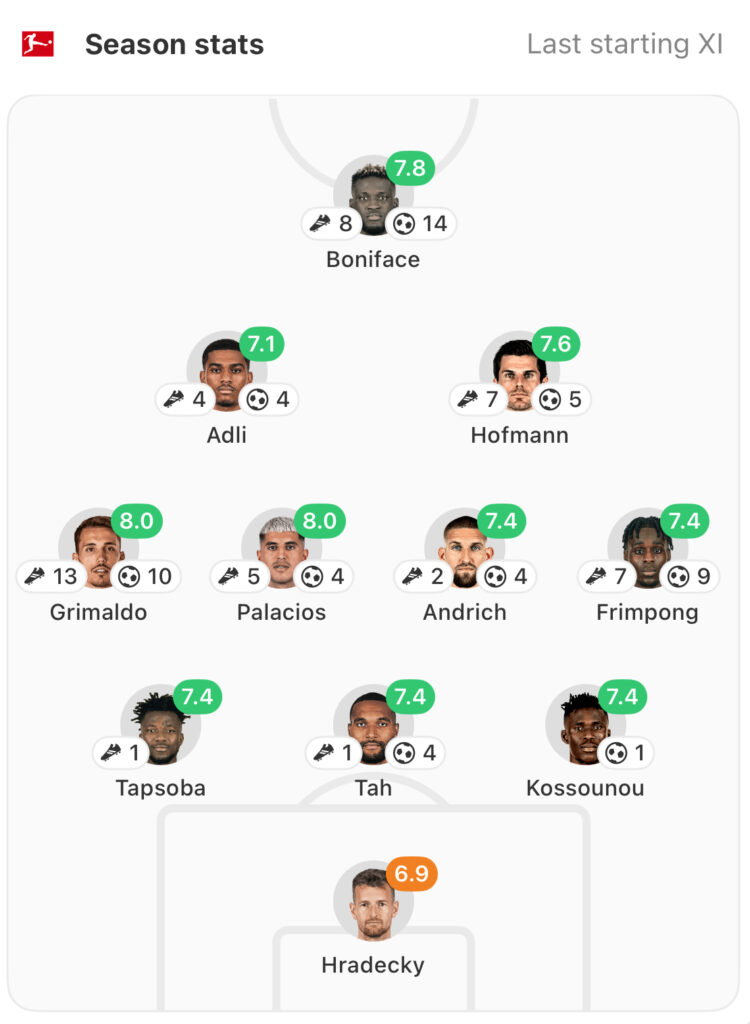
With the group stage all tied up in a neat little bow, Alonso and co could turn their attention back to matters at home. In the cup, things were looking a little dicey in the second round against Sandhausen. After taking the lead twice, Leverkusen finally got the win after three late goals from Hložek and Adli, winning 5-2.
SC Paderborn’s Sebastian Klaas made things a little tense in the round-of-16 tie when he made the score 2-1 in the 83rd minute, but Patrik Schick would score five minutes later to ease any undue stress.
Late goals would become a running theme throughout Leverkusen’s season and big centre-back, Jonathan Tah’s 90th minute header was one of the most important. In the last minute of normal time, Leverkusen’s corner was cleared away before the ball dropped to Florian Wirtz. The 21-year-old looked up and saw Tah making a run before expertly picking him out. Tah couldn’t miss, and Leverkusen were in the semis.
Qualifying top of their Europa League group meant Die Werkself avoided having to play in the knock-out round play-offs. A round in which each second placed side would face third place Champions League teams to find out which is worthy to progress to the round-of-16.
Funnily enough, Leverkusen would end up drawing a side in the last 16 that they had seen off in the group stage, Qarabağ. The Azerbaijanis were back, and they wanted revenge.
The first leg was in Baku, and Qarabağ were determined to make up for their previous embarrassment. The home side were finally rewarded for their electrifying start in the 25th minute, Algerian playmaker, Yassine Benzia opening the scoring with an emphatic finish.
Just before half-time, Qarabağ doubled their lead. Patrick Andrade’s delightful through ball found Juninho who bounced the ball over Matěj Kovář in the Leverkusen goal before rolling it into an open net.
Qarabağ’s incredible first-half display was frustratingly undermined on the 69th minute as an errant back pass found Wirtz through on goal. The playmaker lobbed the ball over the goalkeeper and Leverkusen were back in it.
Wave after wave of Leverkusen attacks crashed upon Qarabağ’s shores. All of a sudden, the game had done a 180, an equaliser felt inevitable. It finally came on the 91st minute after Schick nodded home a cross from Robert Andrich. It ended 2-2, the tie still in the balance.
In the group stage, Leverkusen beat Qarabağ 5-1 at the BayArena. It was one of their more convincing victories of the season. This time, it would be anything but.
The first half came and went, neither side had any real chances to take the lead and grab the tie by the scruff of the neck. All the drama came in the second. Qarabağ silenced the home fans on the 58th minute, Abdellah Zoubir beating Jeremie Frimpong at the back-post to score an easy header.
Frimpong was through on goal before Elvin Cafarguliyev brought him down. Referee Anthony Taylor initially gave a yellow card, but VAR intervened, and it was changed to a red.
It looked like Qarabağ had shot themselves in the foot once again but four minutes after the red card, they doubled their lead. Juninho, the man who scored a lovely goal in the previous game snuck in front of his marker and scored from close range.
Leverkusen looked shell shocked, but they didn’t give up. Frimpong made up for his previous mistake, scoring an excellent volley on the 72nd minute to bring them back into the game.
The minutes ticked by, Leverkusen were all but out until Schick popped up to once again break Qarabağ hearts. The Czech forward was in the right place at the right time to meet Álex Grimaldo’s cross, equalising at the near post.
The home side smelled blood in the water. Qarabağ were there for the taking and Schick was circling them like a shark. Finally, on the 98th minute, he made the killing blow. This time Exequiel Palacios was the provider, whipping it in for Schick to nod in. Leverkusen had snatched victory from the jaws of defeat.
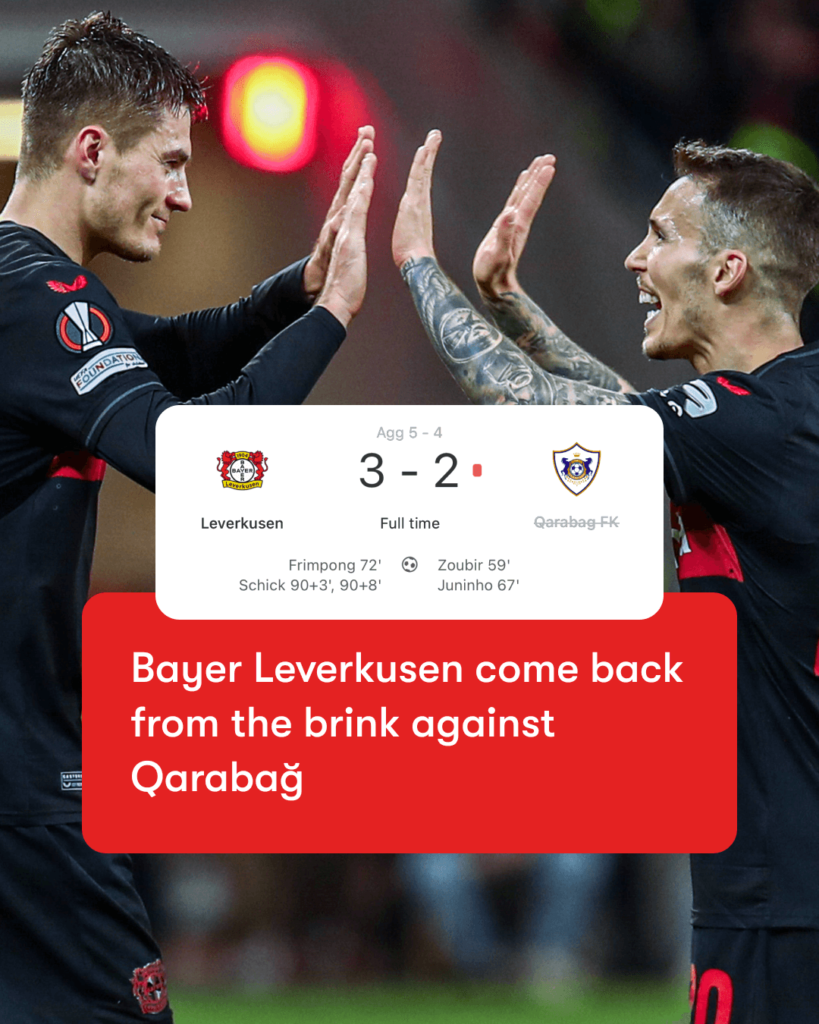
By the time Leverkusen were due to play West Ham in the quarter finals, they had reached the final of the DFB Pokal. Fortuna Düsseldorf provided little opposition as they were beaten 4-0 thanks to goals from Frimpong, Adli, and two from Wirtz. Alonso and his side had reached their first final of the season.
When we said late goals were a running theme throughout Leverkusen’s season, we meant it. The first game against West Ham looked like it was heading for a goalless draw up until the 83rd minute when Jonas Hofmann finally broke the deadlock with a volley from a corner.
Leverkusen were peppering West Ham’s goal from set pieces; it was only a matter of time until they doubled their lead. Finally, Victor Boniface scored a header to give his side one foot in the semis.
Michail Antonio scored in the 13th minute of the second leg to set up an anxious match, but West Ham couldn’t capitalise and Frimpong eventually equalised on the 89th minute.
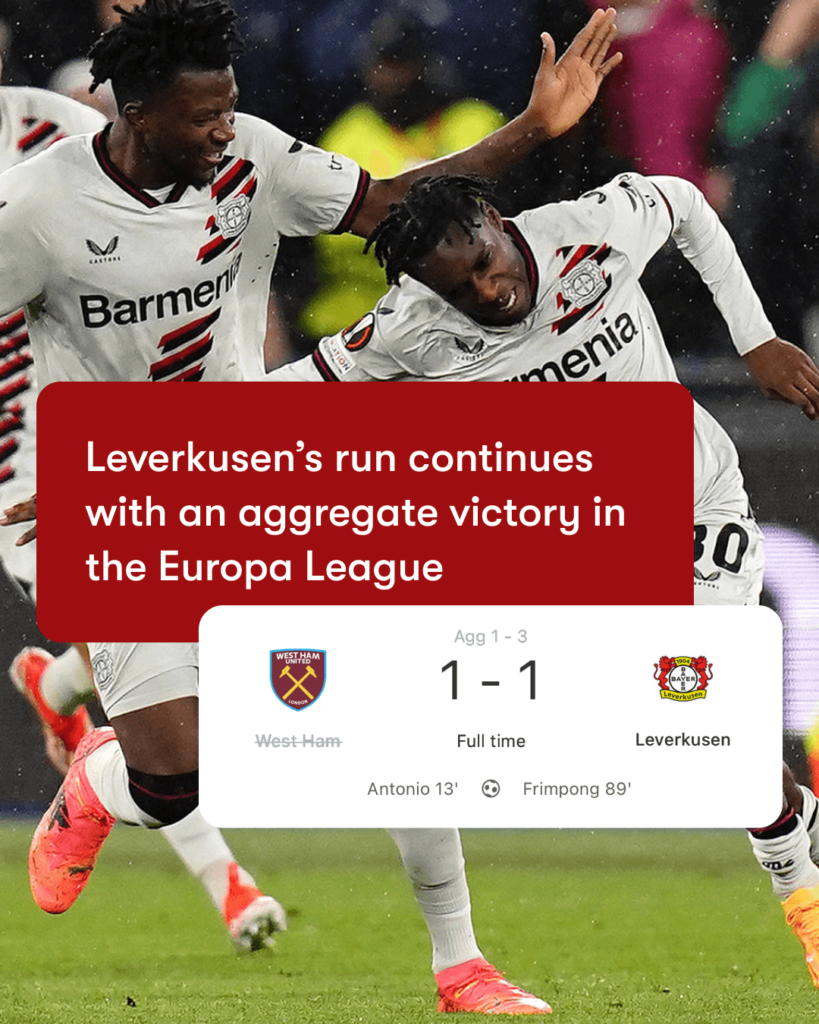
Roma away in the first leg of the semi-finals was, on paper, Leverkusen’s hardest match of their Europa League campaign. Rejuvenated under Daniele De Rossi, I Giallorossi had turned their season around after a poor start with José Mourinho at the helm.
Both sides had their chances, Romelu Lukaku struck the crossbar with a header two minutes before Frimpong hit the side netting after a rapid counterattack. Two minutes after that, Wirtz had the ball in the back of the net following some calamitous defending from the home side.
Half time passed with Leverkusen still leading 1-0. The second half was much like the first, each side had their chances, but the visitors were the only ones taking them. Robert Andrich made it 2-0 on the 73rd minute with a thunderbolt from outside the box. Advantage Leverkusen.
Two Roma penalties in the first and second halves of the home leg, both scored by Leandro Parades, made the tie level on aggregate. Once again, Leverkusen left it late to secure their spot in the next round.
Mile Svilar in the Roma goal was having a great game up until the 82nd minute. The goalkeeper was left flapping at a Leverkusen corner before it bounced off Gianluca Mancini and into the back of his own net.
As it stood, Leverkusen were heading to the final, then, in the 97th minute, they made it certain. Josip Stanišić cut inside from the right-wing and slotted the ball in.
Before this season, Bayer Leverkusen had only won two major trophies in their history. Now, they might win three, all without losing a game. When it rains, it pours.
(Cover image from IMAGO)
You can follow every game from the Eredivisie live with FotMob — featuring deep stats coverage including xG, shot maps, and player ratings. Download the free app here.
